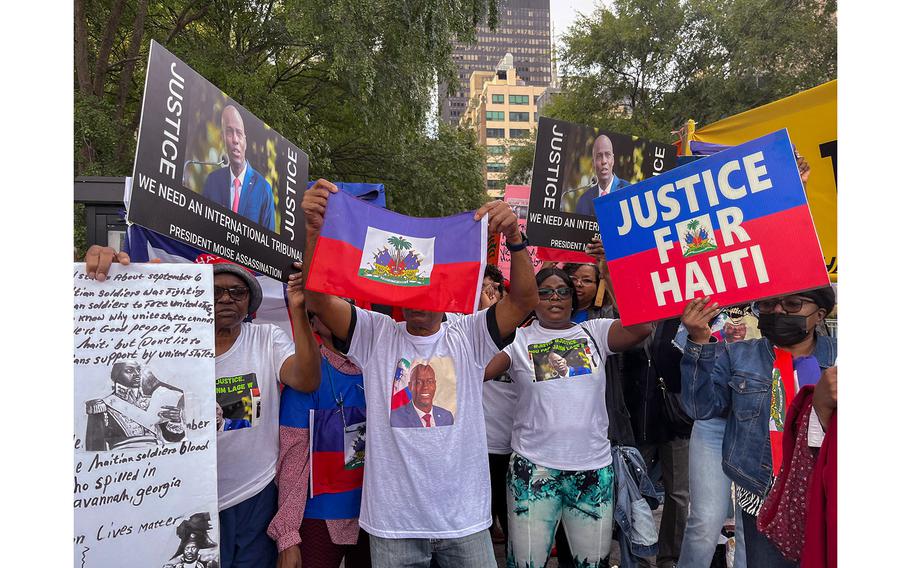
Supporters of assassinated Haitian President Jovenel Moïse hold a rally outside United Nations headquarters in New York City on Sept. 22, 2023. (Diane Desobeau/AFP/Getty Images/TNS)
(Tribune News Service) — A historic Miami trial spotlighting the assassination of Haiti’s president will likely be held months after its scheduled date in May for the remaining five defendants who have not reached plea deals with federal prosecutors.
On Tuesday, prosecutors told a federal judge that they’re willing to delay the trial until October. But defense attorneys said they needed even more time — until March of next year — citing the huge volume of evidence, the logistical challenge of meeting with their clients detained in a federal lock-up and the backdrop of extraordinary turmoil in Haiti.
Jacqueline Becerra, the newly confirmed federal judge who was handed the remainder of the case by veteran jurist Jose Martinez on Tuesday, ordered both sides to make their arguments for a new trial date in writing. But she made her timeline clear.
“It looks like a continuance (of the trial) is in order, but I’d be surprised if it’s going to be a year,” said Becerra, who, as a magistrate judge, had been reviewing some of the pre-trial motions by both sides in the Haiti assassination case.
The high-profile U.S. case is at a crossroads: five of the 11 defendants have pleaded guilty to conspiring to kill Haiti’s president, Jovenel Moïse, on July 7, 2021, resulting in life sentences that they hope to get reduced with their cooperation. A sixth defendant also pleaded guilty to conspiracy charges involving the smuggling of bulletproof vests that were illegally exported to Haiti for a group of ex-Colombian soldiers who carried out the deadly attack.
The remaining five defendants are charged with conspiring in South Florida to kidnap or kill Haiti’s leader and related charges, including recruiting the Colombian commandos. The conspiracy charge carries up to life in prison.
The defendants facing trial are: Antonio Intriago, the head of a Miami-area security firm, CTU; Arcangel Pretel Ortiz, a former FBI informant who joined Intriago at CTU; Walter Veintemilla, a Broward County financier; James Solages, a Haitian American; and Christian Emmanuel Sanon, a Haitian pastor and physician who was initially seen by the group as a successor to Moïse as Haiti’s president.
Last month, Sanon was charged with the others for the first time with conspiring to kill Haiti’s leader, after first being accused of trying to carry out a military expedition against a foreign country. It was the fifth superseding indictment filed by prosecutors Andrea Goldbarg, Monica Castro and Frank Russo.
2.5 million pieces of evidence
At Tuesday’s hearing, attorneys for all five defendants said they needed a year or possibly even more time to prepare for trial, pointing out that the federal prosecutors are still in the process of turning over more than 2.5 million pieces of evidence, including text messages, emails and other records.
“If you gave us another year, it would still not be enough time,” said Emmanuel Perez, one of the attorneys for Intriago.
“It’s impossible for us to go to trial in the next couple of months,” he said, referring to the scheduled May 9 trial date. “It is an absolutely overwhelming amount of discovery that we have to process. ... Add to that, what’s going on with the Haitian government is unfathomable.”
Since the president’s assassination at his home outside Port-au-Prince, Haiti has plunged into total chaos as armed gangs have terrorized the island nation with no presidential election on the horizon.
While the U.S. investigation led by the FBI moved quickly, Haiti’s probe of the president’s slaying only resulted in an indictment last month. A total of 51 people were charged by an investigative judge in collaboration with a prosecutor.
Among those accused of the deadly attack: the slain president’s widow, Martine Moïse, who suffered gunshot wounds during the assault on the family’s home.
©2024 Miami Herald
Visit at miamiherald.com
Distributed by Tribune Content Agency, LLC.